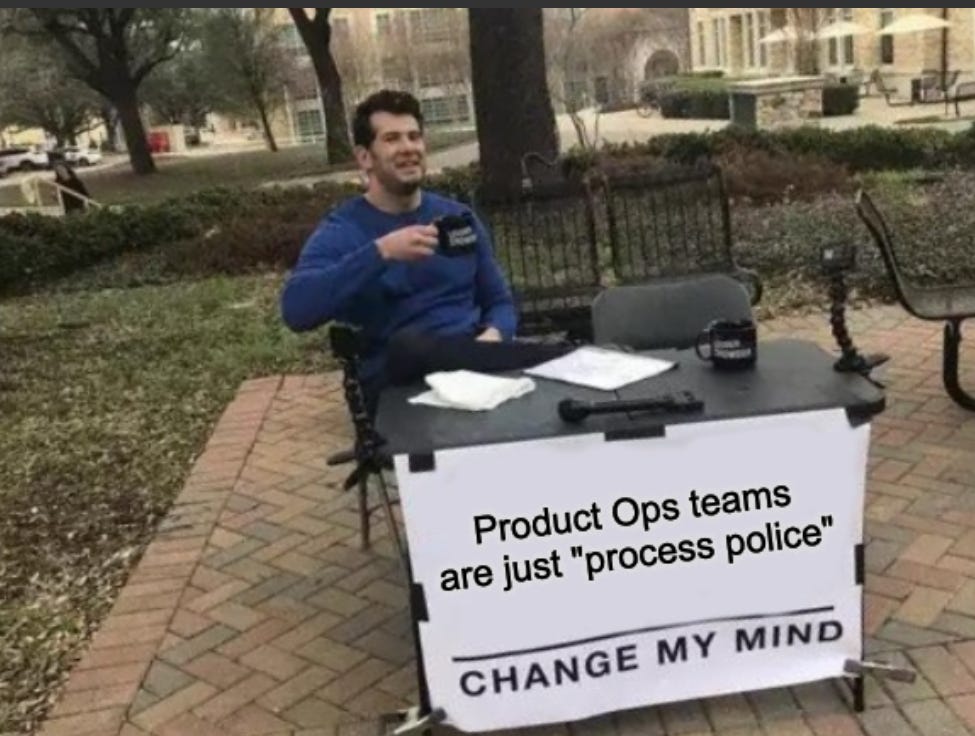Unlocking Value in Product Ops: How To Avoid the dreaded "Process Police" Label
Working in Product Ops comes with its challenges. A common fear is being labeled the "process police"—the enforcer of rules without adding substantial value. Here's how to avoid that trap.
Product Operations is growing in popularity. As more companies add or expand this role, it’s important to realize there are traps to avoid if you want to ensure Product Ops delivers it’s expected benefits. While many critics of the role see it as a team of “process police,” there are also a growing number of Product Managers (PMs) and Product Leaders who sing it's praises.
While it’s true that process is often a core focus of Product Ops teams, and if you work in Product Ops, you know the fear of acquiring the dreaded “process police” label. But there are ways to elevate your impact and deliver value that goes beyond the confines of processes. Let's explore some key questions that can guide you in this journey:
Improving Decision-Making Velocity and Quality
How can you increase the speed or quality of decision-making for Product Leaders?
If you're worried about being seen as the “process police,” focus on enhancing the speed and quality of decision-making for Product Leaders. Ask yourself, what blind spots do they have? How can you streamline their decision-making? Are there ways to provide critical information faster, enabling leaders to make informed choices promptly?
The same is possible for PMs and their teams. How can you enable them to arrive at key insights faster? How can you remove blockers around how they access customer and product data? How can you assist them at extracting key insights from that data faster? These efforts can help PMs and their teams make important strategic decisions that drive real impact for the organization.
By actively contributing to decision-making efficiency, you transform your role into a catalyst for progress.
Empowering Product Managers and Their Teams
A key question to ask is: How can you empower PMs and their teams? Consider strategies to expedite information flow and enhance collaboration. Ask yourself, how can you contribute to a smoother workflow for PMs? Are there tools or systems that can facilitate better communication?
Another potentially enlightening question to ask your PMs: Where is process slowing them down? As Product Ops, we need to be open to the idea that sometimes less process is the answer.
By actively supporting PMs, you become an invaluable ally in driving the success of the entire product team.
Accelerating Customer Insights Delivery
One of the crucial roles of Product Ops is ensuring that customer insights and product usage data reach PMs promptly. Ask yourself (and your PMs), how can you create systems that deliver these insights sooner or more frequently? Can you optimize data collection processes or implement tools for real-time feedback? How can you help them synthesize that feedback?
One potential low-hanging fruit opportunity might be to take the burden of setting up customer interviews off the plate of your PMs. No, I’m not advocating for you to interview customers on behalf of the PMs. Instead, I’m suggesting you look into how you can remove the friction that exists around getting these conversations scheduled.
Teresa Torres’ approach to automate the recruiting process might be something you explore in this area. PMs are often too busy with other demands to setup a process like this, yet it can be a tremendous value unlock for them. So why not help them out and take on an initiative like this?
By expediting the flow of valuable information, you become a catalyst for driving customer-centric decision-making.
Strengthening Cross-Functional Relationships
To move beyond the “process police” stigma, focus on strengthening relationships between the product team and other departments. Ask yourself, how can you enhance collaboration with engineering, marketing, or customer support? Are there communication channels that can be improved?
Lacking visibility into what the Product team does with insights brought to them by other teams is often a common complaint. Same for what the PM teams are working on. These are great opportunities for Product Ops to provide visibility into these areas for the adjacent teams and the broader organization at large.
By fostering cross-functional relationships, you break down silos and become a bridge that enhances overall team synergy.
Closing thoughts
Product Ops teams can easily slip into the trap of focusing on process - especially when teams are experiencing rapid growth. But Product Ops professionals have lots of opportunities to elevate their roles, deliver tangible value, and dispel the “process police” label. It simply requires digging into areas that are often overlooked.
Consider, what’s keeping your product leaders up at night? Often these are things like speeding up approvals and decision-making, empowering PM teams, access to key insights, and relationships with other teams across the business. Each of these areas contain high-leverage opportunities to drive value for your team and the business.
Interested in learning more about Product Ops? Check out my other articles for help getting started:
Want Product Ops templates?
There are no shortcuts in life… but a good template is pretty darn close! I’ve packaged up 10 of my favorite Product Ops templates for anyone who wants some help getting started or is already on their Product Ops journey. These are templates that I’ve used in my day-to-day work, and are designed to be easy to use, customize and update.
You can find the Product Ops templates here:
👉 👉 Product Ops templates 👈 👈


